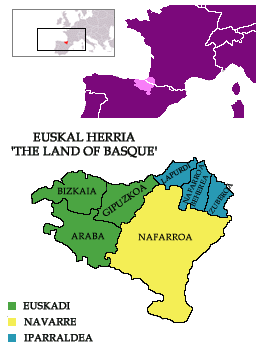
The Basque language is a pre-Indo-European language of prehistoric origin that has no connection to any other in the world. Its Basque denomination is Euskara, as well as its colloquial versions: Euskera, Eskuera and Üskera. Castilian acquired the first colloquial version to denominate the language and it is the most used in the daily speech. Euskara is also known by the traditional term 'Vascuence' which comes from the Latin term 'vasconice', although it is used to a lesser extent. A Latin expression denominates the language as well: Lingua Navarrorum (the language of the Navarreses), since King Sancho VI, called 'The Wise', named it like this in one of his manuscripts of 1167.
At the present time, the Basque language is spoken in the southwest of Europe, in the following territories located on both sides of the western Pyrenees: Alava (Araba), Biscay (Bizkaia), Guipúzcoa (Gipuzkoa), Labourd (Lapurdi), Lower Navarre (Nafarroa Beherea), Navarre (Nafarroa) and Soule (Zuberoa).
 Beyond the Basque area, Euskara is spoken in the border cities between Gascony and Lower Navarre, as well as the Béarn (Gascony) and Soule (the canton of Oloron, in the towns of Eskiula and Jeruntze). On the other hand, there are more than one hundred thousand people that preserve or have recovered the language in the Basque diaspora, by means of the institutions known as 'Euskal Etxea' or Basque Centres, that have been established all over the world. In all, about one million people speak the language at the moment.
Beyond the Basque area, Euskara is spoken in the border cities between Gascony and Lower Navarre, as well as the Béarn (Gascony) and Soule (the canton of Oloron, in the towns of Eskiula and Jeruntze). On the other hand, there are more than one hundred thousand people that preserve or have recovered the language in the Basque diaspora, by means of the institutions known as 'Euskal Etxea' or Basque Centres, that have been established all over the world. In all, about one million people speak the language at the moment.
Over the centuries many researchers have tried to shed light on the enigmatic origin of the Basque language and its people. Throughout this web site, we will know the different theories about this issue as well as the history of Euskara since the remote ages until the present times.
The language that is spoken by the Basque people, the most ancient one of Europe, is a unique language in the Old Continent. It is a remain of the languages that spoke the former inhabitants of Europe before the Indo-European expansion, which is currently surrounded by an ocean of Neo-Latin languages. Although the Basques and their language extended over the Pyrenees from the Cantabrian sea to the Mediterranean in the 1st century A.D., the Romanization and the subsequent expansion of the emerging Latin peoples of the surroundings made the Basques be submerged in a century-old process of cultural assimilation, which led them to their disappearance from a great part of the Pyrenean area. At this time, they live in the region that comprises the eastern Cantabrian area and the western Pyrenees.
The origin of the term 'Euskara', that gives name to the Basque language, possibly comes from the old verb *enautsi (to say / to tell), which is currently kept in some forms of the Biscayan conjugation of the verb 'esan' (to say / to tell), like the following example: dinosta [(she/he) tells me (something)].
The verb *enautsi and the suffix -(k)ara (the way of doing something) would have given rise to the word *enauskara ('the way of speaking'). Over the centuries, this word evolved phonetically to the current standard form 'Euskara' (*enauskara>*enuskara>euskara), as well as to the above-mentioned colloquial forms.
According to some linguists, Euskara was a part of an ancient Eurasian group prior to the diffusion of the Indo-European languages in Europe (3rd or 5th millennium B.C.). On the contrary, Linguistics considers this theory as not proven and defines Euskara as a language isolate, that is, without any connection to other known language, as well as that it has been spoken on both sides of the Pyrenees since prehistoric ages. Beside this, it is also underlined the fact of that the Basque language was already established in the Pyrenean area long before the arrival of Iberian to the Peninsula.
Euskara has evolved the same as other languages, and has enlarged its vocabulary thanks to the different peoples to which the Basques made contact throughout history. This is how the Basque language has gained cultural words that were spread over the Mediterranean by the agricultural Neolithic transmitters (5th millennium B.C.) and later by the early civilizations of the Age of Metals (3rd millennium B.C.).
Share this page!

